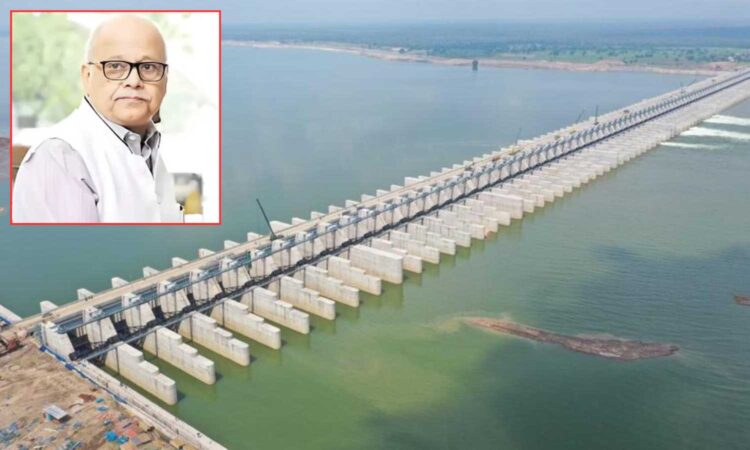The judicial commission investigating the Kaleshwaram project questioned former engineers about cost escalations, agreements, and approvals related to the Medigadda, Annaram, and Sundilla barrages.
HYDERABAD: The judicial commission investigating the Kaleshwaram project has intensified its inquiry, questioning retired engineers over financial approvals, cost escalations, and decision-making processes regarding the Medigadda, Annaram, and Sundilla barrages.
During Thursday’s hearing, retired Engineer-in-Chief (ENC) General Muralidhar stated that the then-Chief Minister K. Chandrashekar Rao (KCR) had approved the advance payment of 60% to construction firms for additional works related to the barrages. He further revealed that these funds were allowed to be used for procurement and reimbursement of extra expenses. Additionally, provisions were made to acquire machinery for clearing trees in forested areas and for other related needs.
Commission Questions Altered Agreements and Costs
Muralidhar appeared before the Kaleshwaram Judicial Commission along with retired ENCs Nalla Venkateswarlu, Narender Reddy, and ENC Hariram. Justice Pinaki Chandra Ghose, chairing the commission, cross-examined them on key financial and procedural aspects of the project.
When asked about the total expenditure on the barrages, Muralidhar estimated the cost to be between ₹8,000 crore and ₹9,000 crore. However, Justice Ghose pointed out that the Detailed Project Report (DPR) submitted by WAPCOS projected an estimate of ₹13,559 crore. The commission asked whether agreement conditions were altered during a meeting chaired by the then-CM on December 9, 2017, to which Muralidhar admitted that they were.
The commission further questioned whether discussions were held with WAPCOS before changing the locations of the Annaram and Sundilla barrages. Muralidhar confirmed that discussions took place but admitted that no official documentation was available to support this claim. The commission criticized the lack of communication with WAPCOS on such a crucial decision.
Engineering Lapses and Accountability
The commission questioned retired ENC Nalla Venkateswarlu about delays in the design and drawings of the barrages. He initially stated that the Central Designs Organization (CDO) delayed the process but later admitted that no official letters were sent urging faster submission. When asked if any communication was made to the Irrigation Principal Secretary or the High-Power Committee regarding design delays, he responded that none was issued.
Additionally, the commission asked who had ordered the storage of water in the barrages. Muralidhar stated that it was directed by the then-CM and Irrigation Minister, both positions held by KCR at the time.
Penalties and Oversight Concerns
The commission also questioned whether any penalties were imposed on construction firms for delays in the barrage works. Venkateswarlu admitted that no penalties were imposed. The commission expressed displeasure, stating that not enforcing penalties benefited the agencies at the cost of public funds.
Further, when asked whether any agreements were signed before allocating land for barrage construction, Muralidhar responded that no separate agreements were needed. The commission raised concerns about the oversight of the project, questioning whether the Chief Engineer (CE) was responsible for its monitoring and operation and maintenance (O&M). Muralidhar stated that these responsibilities fell on the construction agencies post-handover.
When asked about the expenditure on WAPCOS’ DPR, Muralidhar clarified that only ₹19 crore was spent, contrary to earlier claims of ₹649 crore. The commission expressed dissatisfaction, stating that the DPR from WAPCOS was never fully considered.
Judicial Commission’s Stern Warning
The commission confronted ENC Hariram about communication with the expert committee overseeing Kaleshwaram. Hariram initially requested three days to verify records but was firmly denied any further time, as the commission asserted that no communication had taken place.
During cross-examination, the commission questioned whether Kaleshwaram Corporation had any involvement in the construction of the barrages. The engineers denied any direct association. They were also asked if industries had signed agreements with Kaleshwaram Corporation for revenue generation, to which they stated that no records were available.
The inquiry continues to uncover inconsistencies in documentation, financial transactions, and administrative decisions related to the Kaleshwaram project.










